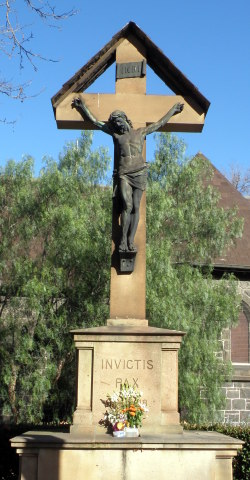|
Vicar's Musings for Ordinary Sunday 2416 September, 2012
Thomas Merton At this week's Mystics Anonymous meditation group we were reflecting on a passage from Thomas Merton's journal Conjectures of a Guilty Bystander. The quote above reminded me of a story I wrote some years ago, loosely based on a parable in Frederick Nietzsche's Thus Spake Zarathustra: Once upon a time there lived a woman. The woman was very successful. She had everything a person could ever ask for: plenty of money, employees at her beck and call, and numerous friends to fill her luxurious mansion whenever she threw one of her legendary parties. But for all her possessions and popularity the woman was never quite content; a feeling of emptiness always seemed to well up within her. One day the woman was out wandering mournfully in her beautiful gardens, "I wish I knew why I feel so sad. I have everything and yet it feels like nothing." Imagine her astonishment when she heard a voice say, "Do you truly desire the fulfillment of your deepest need?" The woman looked around, but there was not a soul in sight. "Well, yes, I do," she replied hesitantly. "It will require great commitment," the voice responded, "you will have to risk everything." The woman thought for a moment. "Yes. The unease is eating away at my very soul. I cannot carry on like this." In an instant the gardens disappeared, the mansion vanished, and the woman found herself in the middle of a vast desert. The scorching sun was beating down on her head, and she felt an almost unbearable load weighing down on her humped back. She had been transformed into a camel. "You shall do as I tell you," the voice boomed, "now walk!" "I suppose I should obey," thought the woman, "although this is not quite what I expected." For the next year the woman wandered the parched landscape, heaving her heavy burden from place to place at the beck and call of her invisible guide. At first a strong desire for fulfillment kept her going, but after a few months she experienced despair as she had never imagined possible. The woman pushed on through the arid emptiness, but finally it was all too much to bear. She stopped and would not go on. "You shall do as I tell you — journey with me," her guide ordered. It was the last straw: "No, I will not." Suddenly the parched camel's moan was transformed into a confident deafening roar, "No, I will not!" The woman had become a lioness; queen of the deep forest that now surrounded her. The voice of her guide had gone, but that didn't worry the woman initially. At last she had found complete freedom, liberation from the drudgery of the desert. "I will go where I want," she roared, and so she did. The whole forest was hers; no creature dared confront the powerful lioness. After quite some time, to her surprise, the woman began to miss the guide. She could go wherever she desired in the plenteous forest, but for some reason the final words from the desert would not leave her. They started to form a mantra in her mind: "journey with me ... journey with me." Her guide's command began to sound more and more like an invitation. Finally she could bear the loneliness no more. "My friend, my companion, you have probably abandoned me, but if you are still there, I would like to journey with you again." At once the forest disappeared and the woman found herself as a child. She was in a cradle, but her surroundings seemed somehow familiar. "This is your parents' home — journey with me." The voice was much gentler than she had remembered. Looking through the eyes of a child, the woman was taken through her whole life by the unseen guide: the infant years of discovery, the awkwardness of adolescence, marriage, motherhood, a successful career. Much of the journey she remembered, but looking through the child's eyes it seemed somehow different. On many occasions the woman recognized how she had lived like the camel, drudging through deserts of shoulds and should-nots. In her later years she recognised the lioness of self-determination, breaking free from the shackles of expectations, but profoundly alone. Finally the woman found herself once again wandering mournfully through her beautiful gardens. "Now you have arrived, as if for the first time," her guide gently whispered, "do you wish to continue on our journey together?" "Yes," replied the woman, childlike, without hesitation. This "yes" felt different to every other "yes" she had ever uttered. It was not the camel "yes" of duty, nor the lioness "yes" of individuation. This "yes" welled up from deep within her being. This was a "yes" to life, whatever joy or pain that might bring. It was a "yes" of simplicity and integrity. It was a sacred "yes." From Home Grown Stories, ed. by Hugh Kempster |

Views is a publication of |
|
Authorized by the Vicar
(vicar@stpeters.org.au) |
